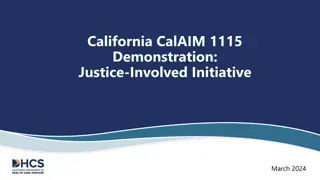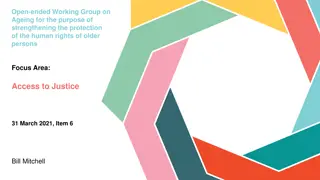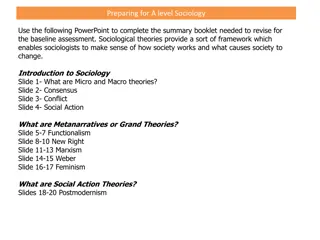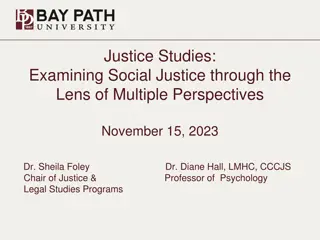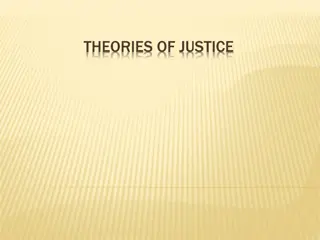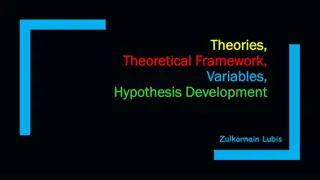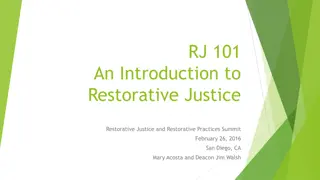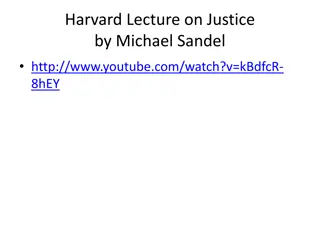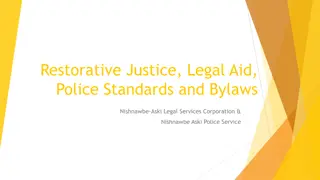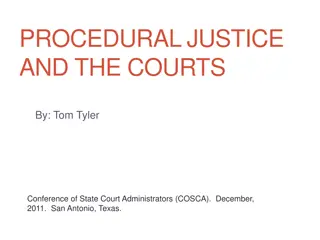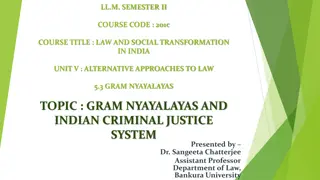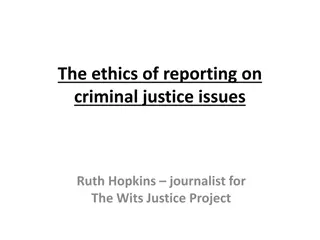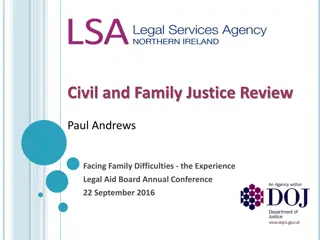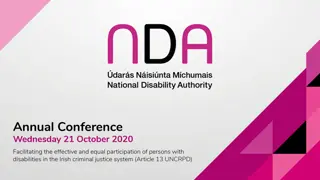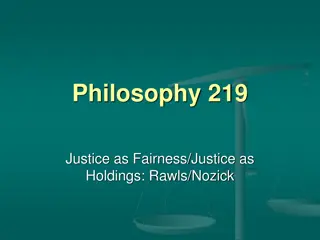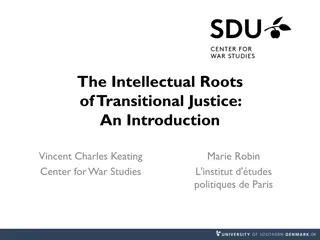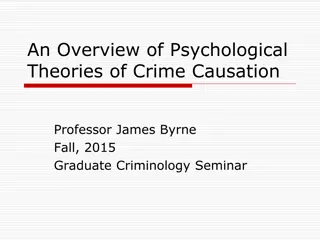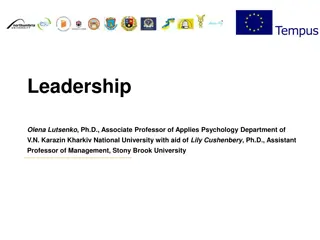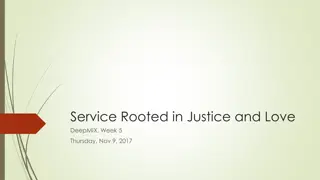Indiana Juvenile Justice Grant Programs RFPs Webinar Details
Indiana Criminal Justice Institute's Youth Services Division is seeking funding proposals for Juvenile Justice grant programs focusing on Community Alternatives, Diversion, and Behavioral Health. The programs align with House Enrolled Act 1359 and aim to enhance services for children in the juvenile
3 views • 30 slides
Community Justice Interventions for Alcohol-Related Offenses
This presentation delves into the various community justice options available for individuals involved in alcohol-related offenses. It outlines the justice process post charges, community justice programs, national policies, successful examples like CPOs with alcohol treatment, challenges faced, and
1 views • 22 slides
Theories Explaining Deviant Sexual Behavior Throughout History
Explore historical theories on deviant sexual behavior, including demonological, anomie, psychoanalytical, human ecology, and somatotyping theories. These theories range from supernatural beliefs of possession to scientific interpretations of societal influences and individual characteristics.
2 views • 33 slides
Business Ethics Theories and Principles
Explore various business ethics theories including Ethical Concepts, Moral Behavior Development, Ethical Principles, and the Role of Ethics in Business. Delve into the concept of ethics, moral behavior evolution, ethical principles like autonomy, honesty, justice, and integrity, and the importance o
10 views • 17 slides
United Nations Survey on Crime Trends and Operations of Criminal Justice Systems
The United Nations Survey on Crime Trends and Operations of Criminal Justice Systems (UN-CTS) focuses on harmonizing data collection, identifying crime patterns, improving monitoring of the criminal justice system, and enhancing international comparability of crime statistics. It was mandated by the
4 views • 18 slides
California CalAIM Justice-Involved Initiative Overview
California's CalAIM Justice-Involved Initiative focuses on supporting individuals involved in the justice system by providing key services pre-release, enrolling them in Medi-Cal coverage, and connecting them with essential behavioral health and social service providers for successful reentry. The i
1 views • 15 slides
Addressing the Justice Gap for Older Persons in Access to Justice
Older persons face a significant justice gap, with millions unable to access civil, administrative, or criminal justice. The absence of dedicated international norms, ageism, and limited UN frameworks contribute to this issue. Barriers include lack of specialist services, digital exclusion, and inad
1 views • 16 slides
Psychological Theories of Criminality: Understanding the Roots
Psychological theories of criminality delve into the association between intelligence, personality, learning, and criminal behavior. Major theories include Psychodynamic Theory by Freud, Behavioral Theory by Bandura, and Cognitive Theory by Kohlberg. These theories explore how unconscious mental pro
1 views • 20 slides
Leadership Theories: Traits and Behaviors
Leadership theories have evolved from trait theory focusing on personal qualities to behavioral theories emphasizing actions and interactions. While early research sought universal traits for leadership, it encountered challenges due to varied traits among leaders and non-leaders. Behavioral theorie
2 views • 29 slides
Unraveling COVID-19 Conspiracy Theories and Hoaxes
Exploring various conspiracy theories surrounding the origins of COVID-19, from bat soup to bioweapons and espionage. Dive into wilder theories involving population control, world war, and even Disney's supposed predictions. Understand the differences between conspiracy theories and hoaxes, shedding
3 views • 11 slides
Sociological Theories and Frameworks
Sociological theories, encompassing micro and macro perspectives, provide a lens to interpret societal dynamics. Consensus theories like functionalism emphasize shared norms, while conflict theories such as Marxism highlight social inequalities. Social action theories like interactionism focus on in
5 views • 21 slides
Online Seminar: Theories of Learning in Initial Teacher Education
This collection of online seminar slides introduces pre-service teachers to major theories of learning, including the Science of Learning through cognitive neuroscience. The presentation aims to help educators consider implications for teaching, recognize theories in action, and pose critical questi
1 views • 11 slides
Theories of Causation in Psychological and Social Sciences
Overview of theories of causation categorized into psychological, social psychological, and sociological perspectives. Psychological theories focus on instinctive, biological, and psychological qualities of abusers, including Attachment Theory, Psychodynamic Theory, Social Learning Theory, and Situa
0 views • 15 slides
Introduction to Quantum Chromodynamics & Field Theories in High-Energy Physics
Explore the fundamentals of Quantum Chromodynamics and Classical Field Theories in this informative lecture, covering topics such as global and local symmetries, Lagrangians, actions, and dynamics. Understand the significance of global and local symmetries in classical field theories, along with exa
5 views • 17 slides
Comprehensive Overview of Student Affairs Theories
This collection explores key theories in student affairs, including cognitive-structural theories, learning theories, and person-environment theories. Cognitive-structural theories delve into how individuals process information, while learning theories examine how people absorb knowledge. Person-env
3 views • 19 slides
Social Justice Perspectives and Educational Practices
Dive into the world of social justice through various lenses, from examining human experience to promoting fairness in society. Discover the importance of reforms in areas like policing and juvenile justice, and explore curricular changes in justice studies. Learn how to promote social justice in yo
1 views • 21 slides
Theories of Justice and Rawls' Principles Explained
Explore various theories of justice including comprehensive, principle-based, and contextual approaches, along with types of justice such as procedural and distributive. Delve into Rawls' social contract and principles of justice focusing on fairness and equality. Discover how Rawls envisions a just
3 views • 22 slides
Theories and Concepts in Research
The content delves into the fundamental concepts of theories and variables in research. It discusses the nature of theories, including descriptive, explanatory, and predictive theories. Additionally, it examines the role of concepts in providing identity and meaning to objects and phenomena. Through
2 views • 55 slides
Classical Trade Theories and Their Limitations in International Economics
Classical trade theories such as the Theory of Absolute Advantage by Adam Smith and the Theory of Comparative Advantage by David Ricardo highlight the benefits of free trade and specialization based on natural advantages. However, these theories have limitations, such as the inability to explain sce
0 views • 8 slides
Applying Theories and Models in Integrated Health: Module 3 Overview
This module delves into the application of various theories, perspectives, and practice models in integrated healthcare. Students will learn to utilize different theories to enhance their understanding and practice in integrated health, focusing on aspects like personal impact, behavioral change the
0 views • 78 slides
Restorative Justice: A Path to Healing and Justice
Restorative justice is a transformative approach focusing on repairing harm caused by crime. It emphasizes meeting victim needs, offender accountability, and community involvement. This method, different from retributive justice, aims for full resolution and healing. Originating from indigenous prac
1 views • 15 slides
Bureau of Indian Affairs Office of Justice Services
The Bureau of Indian Affairs Office of Justice Services, along with the Office of Tribal Justice Support, plays a crucial role in supporting Tribal Justice systems across various Native American tribes in the United States. They provide assistance in areas such as criminal law, diversion and re-entr
1 views • 13 slides
Ethical Dilemmas and Justice Scenarios Examined
Explore various moral dilemmas and justice-related scenarios presented in thought-provoking situations such as saving a drowning boy, the plank of Carneades, a pregnant woman facing imminent danger, and a philosophical debate on justice theories. Delve into questions of moral obligations, legal impl
0 views • 11 slides
Accelerating Lemma Learning Using Joins in Satisfiability Modulo Theories
Explore the use of joins in accelerating lemma learning within the context of Satisfiability Modulo Theories (SMT). The study covers various SMT applications at Microsoft and delves into the development of the Z3 solver. Key topics include theories, arithmetic operations, array theory, uninterpreted
0 views • 25 slides
Nishnawbe Aski Legal Services Corporation & Restorative Justice Initiatives
Nishnawbe Aski Legal Services Corporation (NALSC) focuses on promoting restorative justice and providing legal aid services within the Nishnawbe Aski Nation (NAN) territory. The organization's foundation mandate, established through resolutions by NAN Chiefs, emphasizes the revitalization of traditi
0 views • 25 slides
Normative Theories of Social and Fiscal Justice in Historical Perspective
The lecture explores normative theories of social and fiscal justice, focusing on social objective functions, utilitarianism, maximin principle, and general social welfare functions. It discusses the challenges of determining social objectives in a world with conflicting values and beliefs, emphasiz
0 views • 24 slides
Theories and Concepts in Semantics: Classical vs. Prototype Approaches
Explore different theories of concepts in semantics, including classical theories based on necessary and sufficient conditions, causal theories, and prototype theories. Compare their strengths and limitations in handling fuzziness, asymmetry, and internal structure of concepts. Discover how experime
2 views • 46 slides
Integrating Theories and Models for Enhanced Health Practice
Explore the application of theories, perspectives, and practice models in integrated health through Module 3. Learn how theories guide assessment, treatment, and patient outcomes. Discover common theories enhancing assessment and supporting individuals through grief and loss. Gain insights into the
0 views • 78 slides
Procedural Justice and Public Trust in the Justice System
The discussion delves into the goals of the justice system, the importance of public trust and confidence, and the concept of legitimacy in the context of the courts. Despite improvements in the delivery of justice, trust and confidence among Americans, especially in minority groups, remain a challe
0 views • 39 slides
Comprehensive Overview of Leadership Theories and Styles
Leadership encompasses the ability to influence a group towards achieving goals by knowing oneself, communicating vision, building trust, and taking effective action. Various leadership styles include Autocratic, Democratic, Free-Rein, and Paternalistic, each with distinct decision-making approaches
0 views • 19 slides
Gram Nyayalayas: Enhancing Justice at the Grassroots Level in India
Indian Criminal Justice System has evolved over the years to ensure justice reaches every individual efficiently. The introduction of Gram Nyayalayas represents a significant step towards this goal by establishing formal mobile courts in villages. These courts aim to enhance access to justice and pr
0 views • 16 slides
Ethics in Criminal Justice Reporting by Ruth Hopkins at The Wits Justice Project
This piece delves into the importance of ethical considerations when reporting on criminal justice issues, as highlighted by journalist Ruth Hopkins at The Wits Justice Project. The article features quizzes posing ethical dilemmas faced by reporters, emphasizing the need for transparency, corroborat
1 views • 15 slides
Reforming Civil and Family Justice System Recommendations
The Civil and Family Justice Review presents key recommendations for reforming the justice system, including the establishment of a unified Family Court, emphasis on problem-solving courts, and promoting solutions outside the court system. Access to Justice Review II focuses on Family Justice Reform
0 views • 8 slides
Ensuring Justice and Support for People with Disabilities in the Criminal Justice System
Research highlights the overrepresentation of individuals with intellectual disabilities and mental health issues in the criminal justice system, underscoring the need for effective access to justice and appropriate accommodations. The Probation Service aims to rehabilitate offenders through communi
1 views • 12 slides
Rawls' Theory of Justice: Balancing Liberty and Equality
John Rawls, a prominent American philosopher, introduced his theory of justice in his influential book "A Theory of Justice." He emphasized the importance of distributive justice and rational choices in shaping fair social arrangements. Rawls believed in a principle where rational agents would selec
0 views • 16 slides
Transitional Justice: An In-depth Exploration
Transitional justice is a response to widespread human rights violations, aiming to acknowledge victims and promote peace, reconciliation, and democracy. This concept involves adapting justice to societies transforming after periods of abuse. It explores contentious terms, ethical goals, potential j
0 views • 7 slides
Psychological Theories of Crime Causation: An Overview
Psychological theories of crime causation explore factors such as psychological development, childhood experiences, socialization, and individual characteristics that contribute to criminal behavior. These theories delve into the influence of mental disorders, personality traits, and psychoanalytic
0 views • 16 slides
Leadership Theories and Styles
Leadership involves influencing a group towards a common goal. Traits, interaction styles, and group dynamics play vital roles in effective leadership. Various theories, such as Trait Theories and Synthetic Leadership Theories, provide insights into different aspects of leadership. Understanding lea
0 views • 41 slides
Service Rooted in Justice and Love
Jesuit General Congregation 32 in 1975 emphasized the integration of faith and justice in all works, marking a new direction for the Society of Jesus. The phrase "The Service of Faith and the Promotion of Justice" encapsulates this mission, pushing every Jesuit to actively promote justice alongside
0 views • 13 slides
Essentials of Mass Communication Theories
Delve into the core concepts of mass communication theories, including theory, models, paradigms, and normative media theories. Explore the functions and approaches of theory definition, alongside examples illustrating empirical and conceptual problem-solving. Uncover the role of media in society th
0 views • 18 slides





